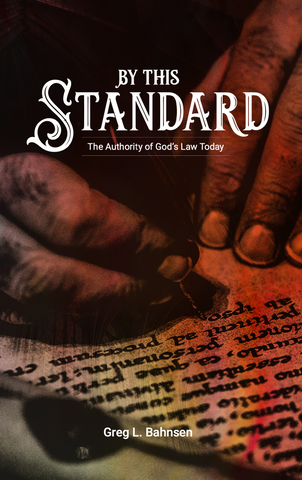[Those who reject special revelation] are like the Irishman who preferred the moon to the sun, because the sun shines in the day-time when there is no need of it, while the moon shines in the night time; so these moralists, shining by the borrowed, reflected light of Christianity, think they have no need of the sun, from whose radiance they get their pale moonlight.[1]
I’ve watched a series of short videos of young people watching videos of songs from a generation or two ago. They were very popular in their day, but these young people had never listened to them, everything from Ram Jam’s “Black Betty” (1977) and AC/DC’s “Thunderstruck” (1990) to The Righteous Brothers’ “Unchained Melody” (1965) and Lynyrd Skynyrd’s “Free Bird” (1974). It doesn’t take long to become disconnected from the past. What’s true of music is also truer of biblical worldview matters and the nature and operation of God’s kingdom (Judges 2:10; 1 Cor. 10:11). Consider the following from Thomas Manton (1620-1677).
It is God’s purpose to set up one kingdom and demolish the other, not only in the hearts of particular men, but in kingdoms and nations and public societies. Jesus Christ was appointed to be not only “king of saints” (Rev. 15:3), but “king of nations” (Jer. 10:7); and therefore not only to erect Himself a throne and a government in the hearts of His people, but to have His religion owned and countenanced, and supported by nations and kingdoms and public societies. So Isa. 55:5, ‘Nations that knew not thee shall run to thee;’ Isa. 60:12, ‘The nations and kingdoms that would not serve thee shall perish;’ Rev. 11:15, ‘The kingdoms of the world are become the kingdoms of our Lord and of his Christ.’ When Christ sent abroad the apostles, he said, Mat. 28:19,’ ‘Go, teach all nations.’ They were not only to gain upon single persons but bring nations to a public owning of Christ.[2]
It’s rare that we hear pastors address contemporary life like Manton or as A.A. Hodge did, so it’s no wonder that the church is weak in addressing the issues of the day:
It is our duty, as far as lies in our power, immediately to organize human society and all its institutions and organs upon a distinctively Christian basis. Indifference or impartiality here between the law of the kingdom and the law of the world, or of its prince, the devil, is utter treason to the King of Righteousness. The Bible, the great statute‑book of the kingdom, explicitly lays down principles which, when candidly applied, will regulate the action of every human being in all relations. There can be no compromise. The King said, with regard to all descriptions of moral agents in all spheres of activity, “He that is not with me is against me.” If the national life in general is organized upon non‑Christian principles, the churches which are embraced within the universal assimilating power of that nation will not long be able to preserve their integrity.[3]

Restoring the Foundation of Civilization
The main reason anti-Christian civilizationists survive and seem to thrive is that Christians have not engaged with, answered, and built a competing alternative culture—THE ORIGINAL CIVILIZATION—founded on the principles found in God’s Word and observable in creation. Moreover, many Christians don’t believe there can be or should be a Christian civilization, so they send their children off to the local government school that is anti-Christian believing that facts are neutral and public education is free. Such thinking comes at a terrible cost.
Buy NowThomas C. Atwood, in his critique of Christian activism during the 1980s, hoped to deal with contemporary moral issues by an appeal to general revelation and its twin brother natural law. He based his summation on what I consider to be a faulty reading and misapplication of Romans 2:14-15. Atwood writes:
A … theological error that has hindered the effectiveness of the Evangelical Right in coalition politics has been a failure to distinguish between the means of special grace and common grace, and between the authorities of special revelation and general revelation…. Special revelation is that revelation which explains the redemptive plan of God—historically considered to be found only in Scripture….
Common grace is that grace available within God’s created order; it is afforded to all people regardless of religious belief. This created order includes not only physical nature but also aspects of metaphysical nature, including the created moral order.
\ * * * * *
General revelation is universally knowable wisdom that points to God as Creator and to the order of His creation. God’s “eternal power and deity [can be] clearly perceived in the things that have been made” (Romans 1:20). His created moral order is knowable by examining “the law written on our hearts” (Romans 2:15). This is the law by which all candid people know that murder is wrong, for example. It is the law by which our consciences, if they are not too cauterized and traumatized by sin, judge us.[4]
Atwood’s summation is fraught with problems, the least of which is more than 35 years of failed attempts to work in terms of a common grace/natural law foundation.
“Two Authorities”
First, Atwood sees special revelation and general revelation as two distinguishable “authorities.” Can natural law and general revelation function in an ultimate sense without any knowledge of special revelation? Are general revelation and natural law results voted on by the people based on a majority vote? How do we know if these laws are in fact God’s laws? Should we expect special and general revelation to agree on all points? If they agree, then general and special revelationists should be working for the same moral order in the particulars with the same results. If one disagrees with the other, then the Christian has a problem. Which authority is the most trustworthy? Atwood and other advocates of an undefined general revelation must answer these questions.
The Advantage of Special Revelation
Second, if general revelation is adequate in the construction of a comprehensive ethical system, then why does Paul say that the Jews have had an advantage since “they were entrusted with the oracles of God”? (Rom. 3:2). Is it only because of special revelation’s unique relationship with God’s plan of redemption? The passage must mean more than this since the “oracles of God” describes God’s special revelation, including those laws that pertain to individual, family, ecclesiastical, and especially civil righteousness. So then, special revelation must have an advantage over general revelation in its formulation of a “moral order.”
The Law as Wisdom
Third, if God’s “created moral order is knowable by examining ‘the law written on the heart,’” then why would the nations marvel at the statutes and judgments that God gave to Israel (“the oracles of God”)? Israel was to “keep and do them, for that is your wisdom and your understanding in the sight of the peoples who will hear all these statutes and say, ‘Surely this great nation is a wise and understanding people’” (Deut. 4:6). In time, nations did come (1 Kings 10:1-10). It was not general revelation that impressed the Queen of Sheba so that “there was no more spirit in her” (v. 5). The nations had general revelation. There was something missing. Israel had a special revelation that would make the people, particularly rulers, much wiser than they could ever be with general revelation alone. This wisdom is not simply the wise use of general revelation. The Psalmist tells us that “Thy commandments make me wiser than my enemies, for they are ever mine” (Psalm 119:98). The entire 119th Psalm is a straightforward commentary on how God’s law gives man “more insight than all [his] teachers” (119:99).
Will it Point to Jesus?
Fourth, under a moral order where general revelation/natural law predominates, with few or any ties with the God of Scripture, we would never hear words similar to the Queen of Sheba: “Blessed be the LORD your God who delighted in you to set you on the throne of Israel; because the LORD loved Israel forever, therefore He made you king, to do justice and righteousness” (v. 9).
Let’s look at a contemporary example. In addressing the Texas legislature, Chuck Colson told the legislators that “the only answer to the crime problem is to take nonviolent criminals out of our prisons and make them pay back their victims with restitution. This is how we can solve the prison crowding problem.” Several of the legislators were amazed at this wisdom. They came up to Colson “one after another and said things like, ‘That’s a tremendous idea. Why hasn’t anyone thought of that?’ I had the privilege of saying to them, ‘Read Exodus 22. It is only what God said to Moses on Mount Sinai thousands of years ago.’”[5]

By This Standard: The Authority of God's Law Today
Millions of Christians, sadly, have not recognized the continuing authority of God's law or its many applications to modern society. They have thereby reaped the whirlwind of cultural and intellectual impotence. They implicitly denied the power of the death and resurrection of Christ. They have served as footstools for the enemies of God. But humanism's free ride is coming to an end. This book serves as an introduction to this woefully neglected topic.
Buy NowIf people are willing to listen to the Bible’s wisdom on issues relating to this life, then maybe they will consider the wisdom that leads to eternal life. In fact, it is this biblical wisdom that attracts many in the unbelieving world to the gospel. A moral system based on general revelation does little to attract people to the Bible that speaks of Jesus Christ.
The Need for Special Revelation
Fifth, Paul tells us in Romans 1:18 that the ungodly “suppress the truth in unrighteousness.” This is why there is the need for special revelation. General revelation can never stand on its own as a means of redemption either personally or culturally.
The Reflective Light of General Revelation
I suspect that advocates of general revelation/natural law are cheating when they claim they can build an ethical system independent of special revelation. They are maintaining that their moon (general revelation) is an independent light not in need of the reflective light from the sun (special revelation). While they are trying to establish the independence of general revelation, they are secretly using the sun’s rays to give light to their moon. If special revelation is at their side to direct them, general revelation advocates will be able to maintain they have a solution to today’s moral crisis in general revelation.
The reason general revelation advocates can develop a general revelation moral theory, to change the analogy, is that they follow an existing set of blueprints. Biblical categories of justice and righteousness are so well known, because of a study of special revelation, that it is easy to look at general revelation and maintain that these same categories can be found there as well. Of course they can, if constant reference is made to the special revelation blueprints.
Social critic Kenneth Myers claims that “there is a biblical mandate for not attempting to solve all cultural and social problems with deductions from Scripture.”[6] Where do we draw the line? Which “cultural and social problems” do we attempt to solve “with deductions from Scripture”? Where do we turn for an answer to this question, special or general revelation?
A whole‑Bible ethic is the light by which all social theories gain their reflected light. The further we move away from the light of Scripture, the darker our world will become. With man’s “cauterized and traumatized” sinful nature, there is no way that we can move in the direction of general revelation for the development of a comprehensive ethical social theory. “Such has been the deteriorating influence of sin that ‘the [work of the] law written on the heart’ and ‘the light of nature,’ although these remain, no longer suffice as the organ of signifying God’s will to man. A supernatural revelation has been necessary to reveal the law of duty, as well as to reveal the method of salvation through redemption.”[7]
[1] A. T. Pierson, The Second Coming of Christ (Philadelphia, PA: Henry Altemus, 1896), 35.
[2] Thomas Manton, The Complete Works of Thomas Manton (London: James Nisbet & Co., 1874), 18:34.
[3] A. A. Hodge, Evangelical Theology: A Course of Popular Lectures (Edinburgh: The Banner of Truth Trust, [1891] 1991), 283–284.
[4] Thomas C. Atwood, “Through a Glass Darkly: Is the Christian Right Overconfident It Knows God’s Will?,” Policy Review (Fall 1990), 49.
[5] Charles Colson, “The Kingdom of God and Human Kingdoms,” Transforming Our World: A Call to Action, ed. James M. Boice (Portland, OR: Multnomah, 1988), 154–55.
[6] Kenneth A. Myers quoted in Atwood, “Through a Glass Darkly,” 49.
[7] Hodge, Evangelical Theology, 279.

